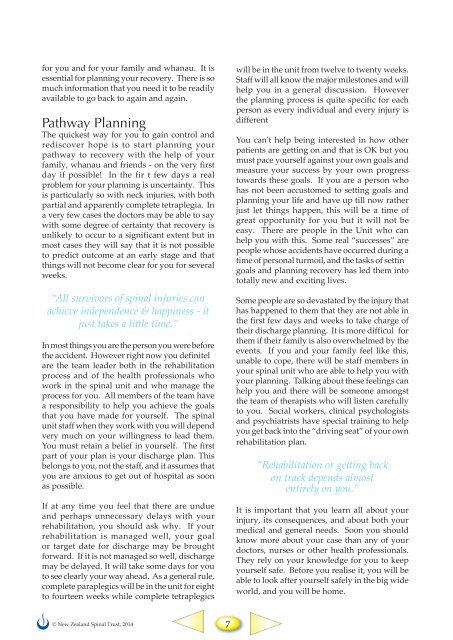o_19m515s4j1asl13rsiok91e166nh.pdf
Create successful ePaper yourself
Turn your PDF publications into a flip-book with our unique Google optimized e-Paper software.
for you and for your family and whanau. It is<br />
essential for planning your recovery. There is so<br />
much information that you need it to be readily<br />
available to go back to again and again.<br />
Pathway Planning<br />
The quickest way for you to gain control and<br />
rediscover hope is to start planning your<br />
pathway to recovery with the help of your<br />
family, whanau and friends - on the very first<br />
day if possible! In the fir t few days a real<br />
problem for your planning is uncertainty. This<br />
is particularly so with neck injuries, with both<br />
partial and apparently complete tetraplegia. In<br />
a very few cases the doctors may be able to say<br />
with some degree of certainty that recovery is<br />
unlikely to occur to a significant extent but in<br />
most cases they will say that it is not possible<br />
to predict outcome at an early stage and that<br />
things will not become clear for you for several<br />
weeks.<br />
“All survivors of spinal injuries can<br />
achieve independence & happiness - it<br />
just takes a little time.”<br />
In most things you are the person you were before<br />
the accident. However right now you definitel<br />
are the team leader both in the rehabilitation<br />
process and of the health professionals who<br />
work in the spinal unit and who manage the<br />
process for you. All members of the team have<br />
a responsibility to help you achieve the goals<br />
that you have made for yourself. The spinal<br />
unit staff when they work with you will depend<br />
very much on your willingness to lead them.<br />
You must retain a belief in yourself. The first<br />
part of your plan is your discharge plan. This<br />
belongs to you, not the staff, and it assumes that<br />
you are anxious to get out of hospital as soon<br />
as possible.<br />
If at any time you feel that there are undue<br />
and perhaps unnecessary delays with your<br />
rehabilitation, you should ask why. If your<br />
rehabilitation is managed well, your goal<br />
or target date for discharge may be brought<br />
forward. If it is not managed so well, discharge<br />
may be delayed. It will take some days for you<br />
to see clearly your way ahead. As a general rule,<br />
complete paraplegics will be in the unit for eight<br />
to fourteen weeks while complete tetraplegics<br />
will be in the unit from twelve to twenty weeks.<br />
Staff will all know the major milestones and will<br />
help you in a general discussion. However<br />
the planning process is quite specific for each<br />
person as every individual and every injury is<br />
different<br />
You can't help being interested in how other<br />
patients are getting on and that is OK but you<br />
must pace yourself against your own goals and<br />
measure your success by your own progress<br />
towards these goals. If you are a person who<br />
has not been accustomed to setting goals and<br />
planning your life and have up till now rather<br />
just let things happen, this will be a time of<br />
great opportunity for you but it will not be<br />
easy. There are people in the Unit who can<br />
help you with this. Some real “successes” are<br />
people whose accidents have occurred during a<br />
time of personal turmoil, and the tasks of settin<br />
goals and planning recovery has led them into<br />
totally new and exciting lives.<br />
Some people are so devastated by the injury that<br />
has happened to them that they are not able in<br />
the first few days and weeks to take charge of<br />
their discharge planning. It is more difficul for<br />
them if their family is also overwhelmed by the<br />
events. If you and your family feel like this,<br />
unable to cope, there will be staff members in<br />
your spinal unit who are able to help you with<br />
your planning. Talking about these feelings can<br />
help you and there will be someone amongst<br />
the team of therapists who will listen carefully<br />
to you. Social workers, clinical psychologists<br />
and psychiatrists have special training to help<br />
you get back into the “driving seat” of your own<br />
rehabilitation plan.<br />
“Rehabilitation or getting back<br />
on track depends almost<br />
entirely on you.”<br />
It is important that you learn all about your<br />
injury, its consequences, and about both your<br />
medical and general needs. Soon you should<br />
know more about your case than any of your<br />
doctors, nurses or other health professionals.<br />
They rely on your knowledge for you to keep<br />
yourself safe. Before you realise it, you will be<br />
able to look after yourself safely in the big wide<br />
world, and you will be home.<br />
© New Zealand Spinal Trust, 2014<br />
7
















